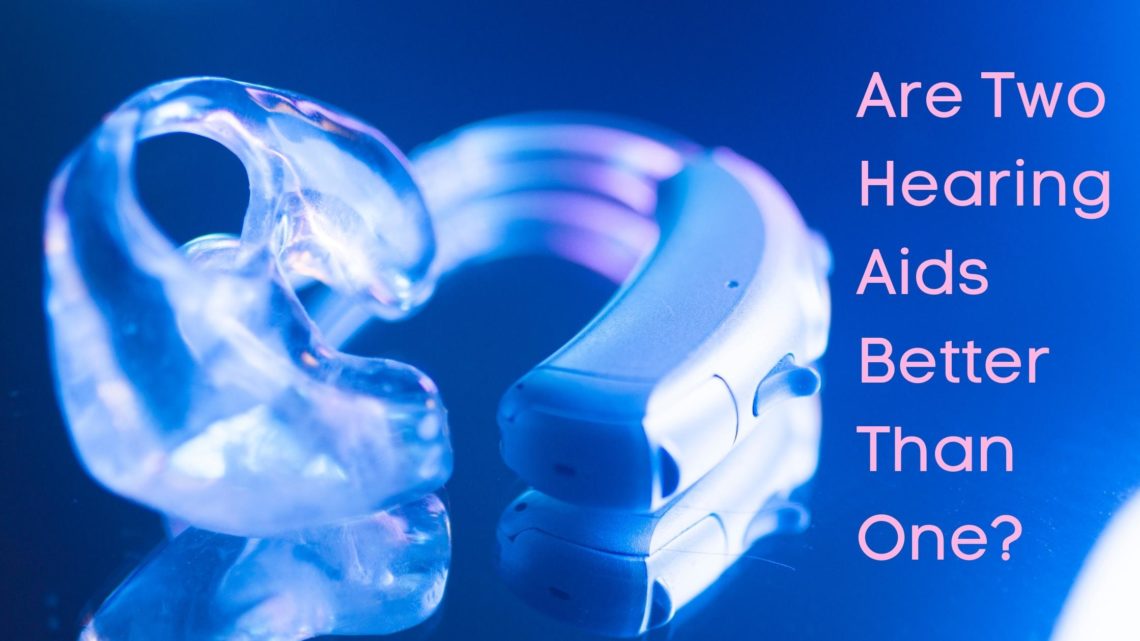Hearing loss is common as we age. In fact, one in three people, 65 years or older have hearing loss and approximately half of those over 75 do. If you are noticing it is harder to hear these days, you may also find that one ear seems to hear worse than the other. The most common treatment for hearing loss is hearing aids, but if only one ear is affected, then do you really need two hearing aids?
One hearing aid or two?
Hearing care professionals almost always recommend two hearing aids, and this is why: Single-sided, also referred to as unilateral hearing loss is rare. In most cases, in one ear, hearing loss is more severe, but the other ear also suffers – it is just not as prominent.
Bilateral hearing and localization
We have two ears for a reason. Hearing with both ears is called bilateral hearing and it helps the brain hear and understand from where sound is coming from. Your brain collects sound from both ears and uses it to localize sound. Localization of sound helps your brain understand where sound is coming from. It can help you understand from what direction someone is shouting your name, an alarm is coming from, or an approaching vehicle, out of sight. In this way, your brain uses both ears to keep you safe when you walk around navigating the world. Amplifying sound in only one ear would make localization confusing and can increase the likeliness of accidents.
Staying active with bilateral hearing aids
When you wear hearing aids that amplify both ears equally your brain has a better sense of space. One of the biggest complaints people with untreated hearing loss have is a lack of independence. When you amplify both ears, you slowly can recover your ability to stay active, venture out on your own and stay more active. You can engage in a healthy exercise routine, to keep your body healthy, your mood uplifted and your mind clear.
The risk of auditory deprivation
Another reason to amplify both ears is to ensure that they both get stimulated regularly. When you rely on just one ear the auditory nerve pathways and the associated centers in the brain, less can atrophy and become less effective at decoding the sounds in your life. When auditory deprivation occurs, your brain will struggle to separate the conversation you are trying to be a part of, from the other noise in a room. This makes going out to restaurants, stores and social engagements exhausting and overwhelming. A study published in the Journal of the American Academy of Audiology examined the ability to recognize words for people who wore one in comparison to two hearing aids. They found that those with two hearing aids had significantly far less decline in word recognition.
Two hearing aids offer improved sound quality
Understanding speech is the cornerstone of good communication. A study by the National Institute of Health (NIH), titled Binaural hearing aids for high-frequency hearing loss, explored the differences between wearing one hearing aid vs. two. The study concluded that two hearing aids enhanced communication and allowed for a clearer comprehension of conversations. This was found to eliminate feelings of loneliness, depression, and anxiety associated with poor communication.
Avoiding high volume
When we wear one hearing aid we may be tempted to boost the hearing level higher than we would when wearing two. Binaural hearing allows for less amplification and higher quality of sound. Increased perception of volume from wearing two hearing aids can allow you to listen at a lower level of amplification, which can eliminate your instinct to shout. Two hearing aids working together also means longer battery life and can even use a smaller hearing aid because you won’t require such a high load of power.
Find out more about hearing aids
Ignoring your hearing loss is perhaps the worst thing you can do for your health. While the issue begins in your ears, it all too quickly affects relationships, mobility, activity level, self-esteem, and sense of independence. If you are curious to find out more about hearing aids, contact us today. We can explore your options and help you find the best fit for all your hearing needs.

